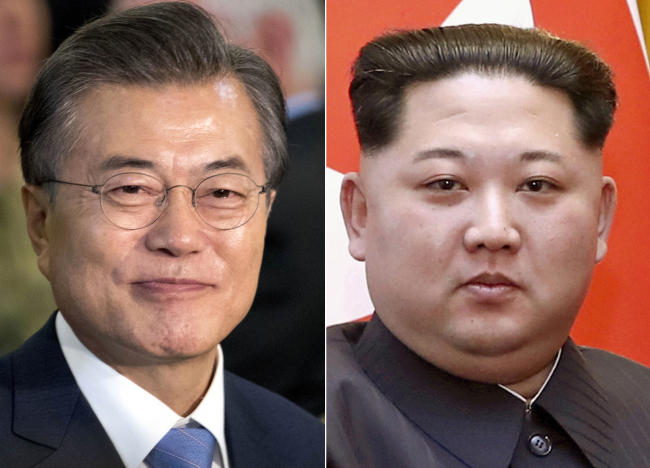Analysts watch for end of 'Korea discount' on prospects of peace treaty
By YonhapPublished : April 19, 2018 - 10:27
A peace treaty that would finally end the 1950-53 Korean War, one of the growing prospects for the upcoming cross-border summit next week, may also end the chronic "Korea discount" in the stock market, analysts said Thursday.
South Korean President Moon Jae-in will meet North Korea's top leader Kim Jong-un on the southern side of the truce village Panmunjom on April 27. It will be the third such inter-Korean summit, and Seoul and Washington have indicated that a peace treaty could be an element in the talks to permanently bring peace to the Korean Peninsula. South and North Korea ended their fratricidal conflict with only an armistice, leaving them technically still at war.
The Korea discount has three causes, according to Yang Ki-in of Shinhan Investment Corp. -- lack of transparency in corporate governance, low dividend payments and cross-border confrontation.
"If peace is declared, then one of these three causes is eliminated," he said.

South-North economic cooperation will gain momentum, and the burden of military spending will ease, helping to boost the gross domestic product, Yang projected.
"Looking further, a major part of the military spending from tense inter-Korean relations can be funneled to industries, which can have the effect of making the entire economy more active," he said. "If the Korean won stays strong from lessening of tensions, we can expect to induce foreign investors looking for profit from exchange rates to invest in Korean firms."
Shinhan Investment Corp. expected shares related to inter-Korean economic cooperation to benefit first from the peace treaty, while offshore investors will likely pick up leading IT stocks like Samsung Electronics and SK hynix.
Kim Yoo-gyeom of Cape Investment & Securities said regardless of the Korea discount, ending tensions with North Korea will allow for a step forward in inter-Korean economic ties. "The pros of investment in Korea will increase," he said.
A peace treaty could lead to North Korea abandoning its nuclear weapons in exchange for a security guarantee, Kim said.
"If sanctions against the North are eased and cross-border economic relations pick up, that will be positive for our economy too."
Byun Joon-ho of Yuanta Korea Securities said he doesn't expect much change from the peace talks. He argued that geopolitical issues do not affect the market's fundamental strength, as shown in the past when impacts from tensions or unexpected incidents lasted only a few days on the market.
"Given the profit rate and the level of valuations of currently listed firms, it's difficult to conclude that the confrontational state with North Korea was bringing down corporate value," Byun said. "Korea is not at war in a realistic sense. Declaring an end to the war will not become a factor for pushing up the market." (Yonhap)



![[AtoZ into Korean mind] Humor in Korea: Navigating the line between what's funny and not](http://res.heraldm.com/phpwas/restmb_idxmake.php?idx=644&simg=/content/image/2024/04/22/20240422050642_0.jpg&u=)
![[Exclusive] Korean military set to ban iPhones over 'security' concerns](http://res.heraldm.com/phpwas/restmb_idxmake.php?idx=644&simg=/content/image/2024/04/23/20240423050599_0.jpg&u=20240423183955)



![[Graphic News] 77% of young Koreans still financially dependent](http://res.heraldm.com/phpwas/restmb_idxmake.php?idx=644&simg=/content/image/2024/04/22/20240422050762_0.gif&u=)
![[Herald Interview] Why Toss invited hackers to penetrate its system](http://res.heraldm.com/phpwas/restmb_idxmake.php?idx=644&simg=/content/image/2024/04/22/20240422050569_0.jpg&u=20240422150649)






![[Exclusive] Korean military to ban iPhones over security issues](http://res.heraldm.com/phpwas/restmb_idxmake.php?idx=652&simg=/content/image/2024/04/23/20240423050599_0.jpg&u=20240423183955)



![[Today’s K-pop] Ateez confirms US tour details](http://res.heraldm.com/phpwas/restmb_idxmake.php?idx=642&simg=/content/image/2024/04/23/20240423050700_0.jpg&u=)